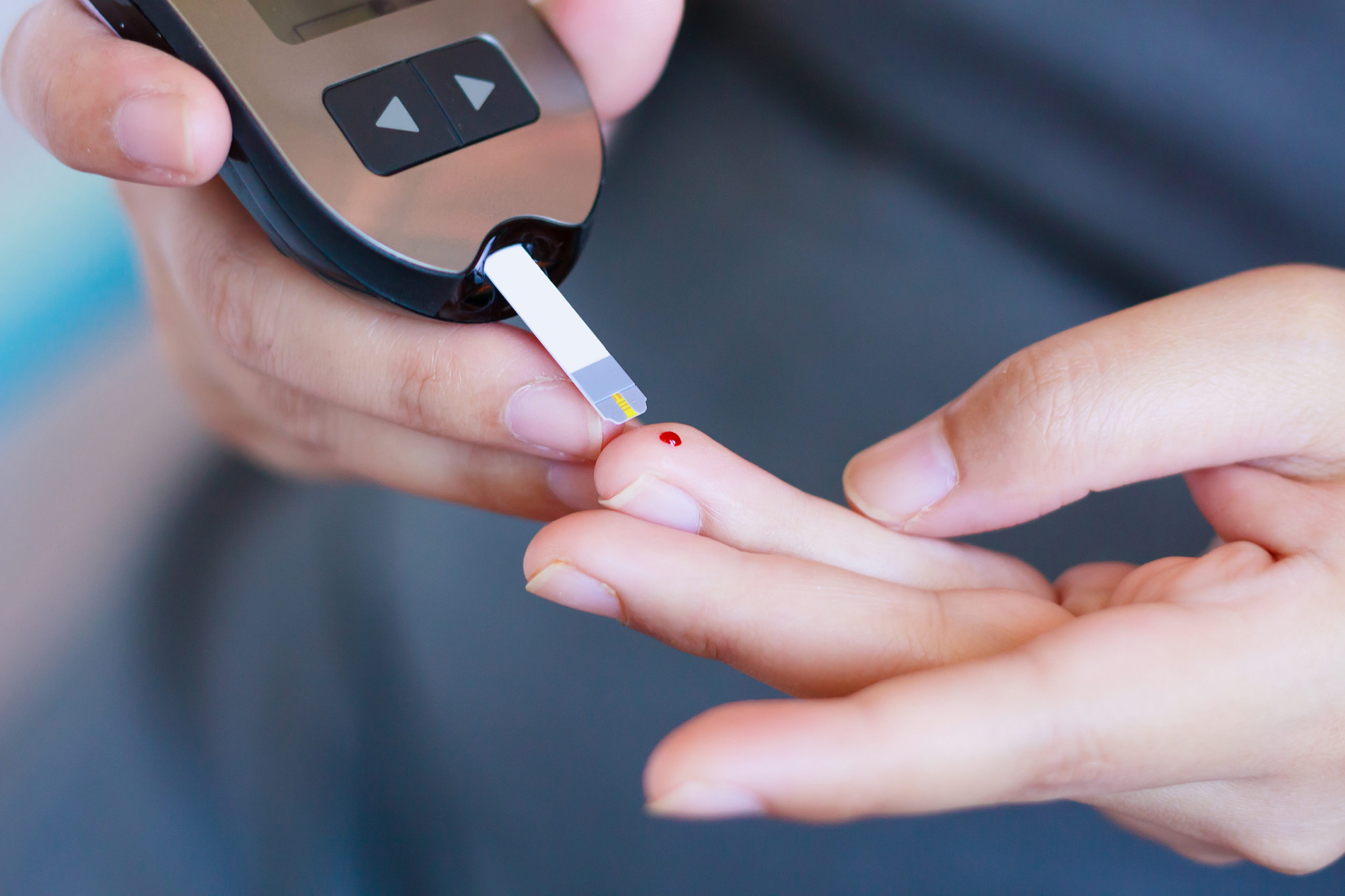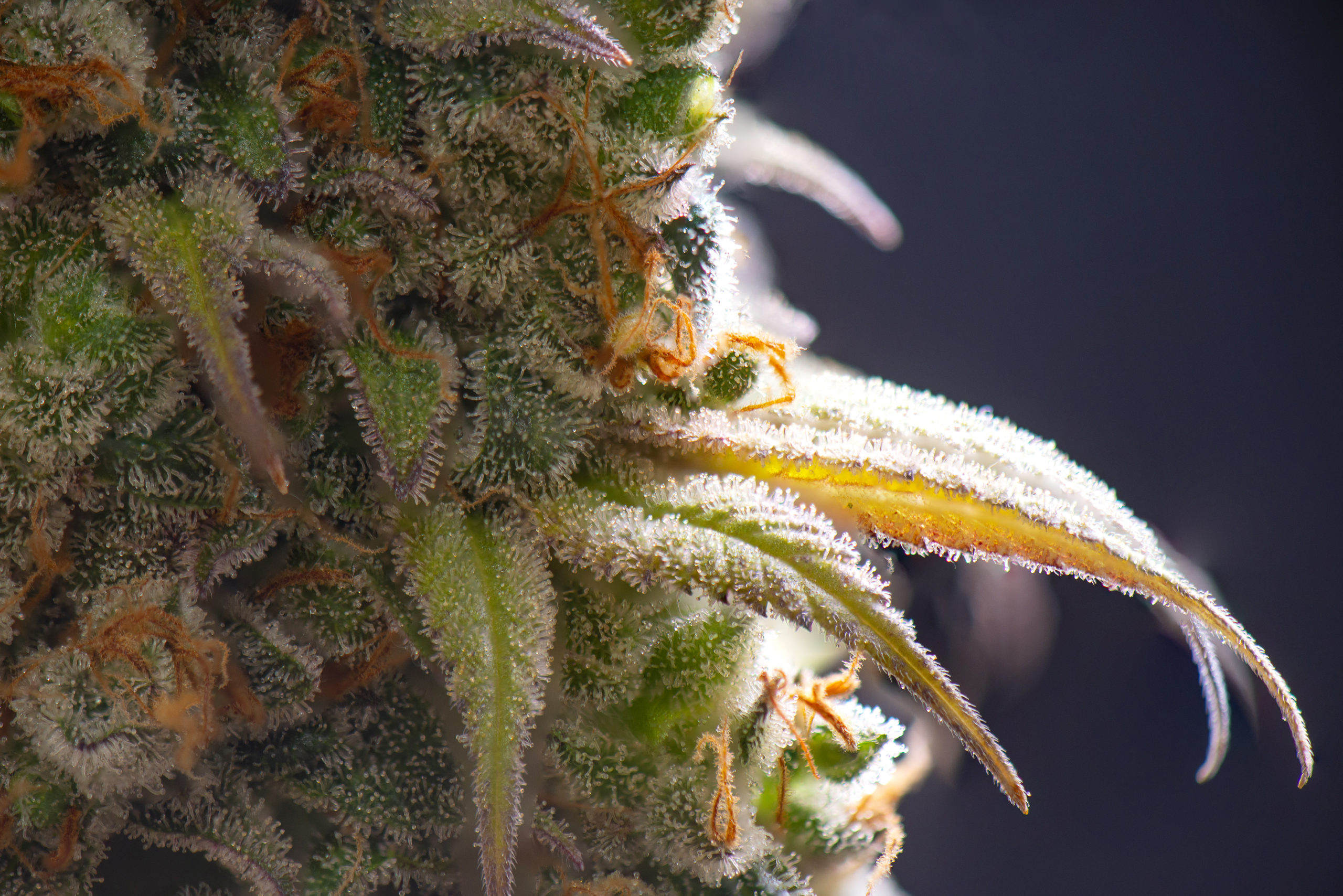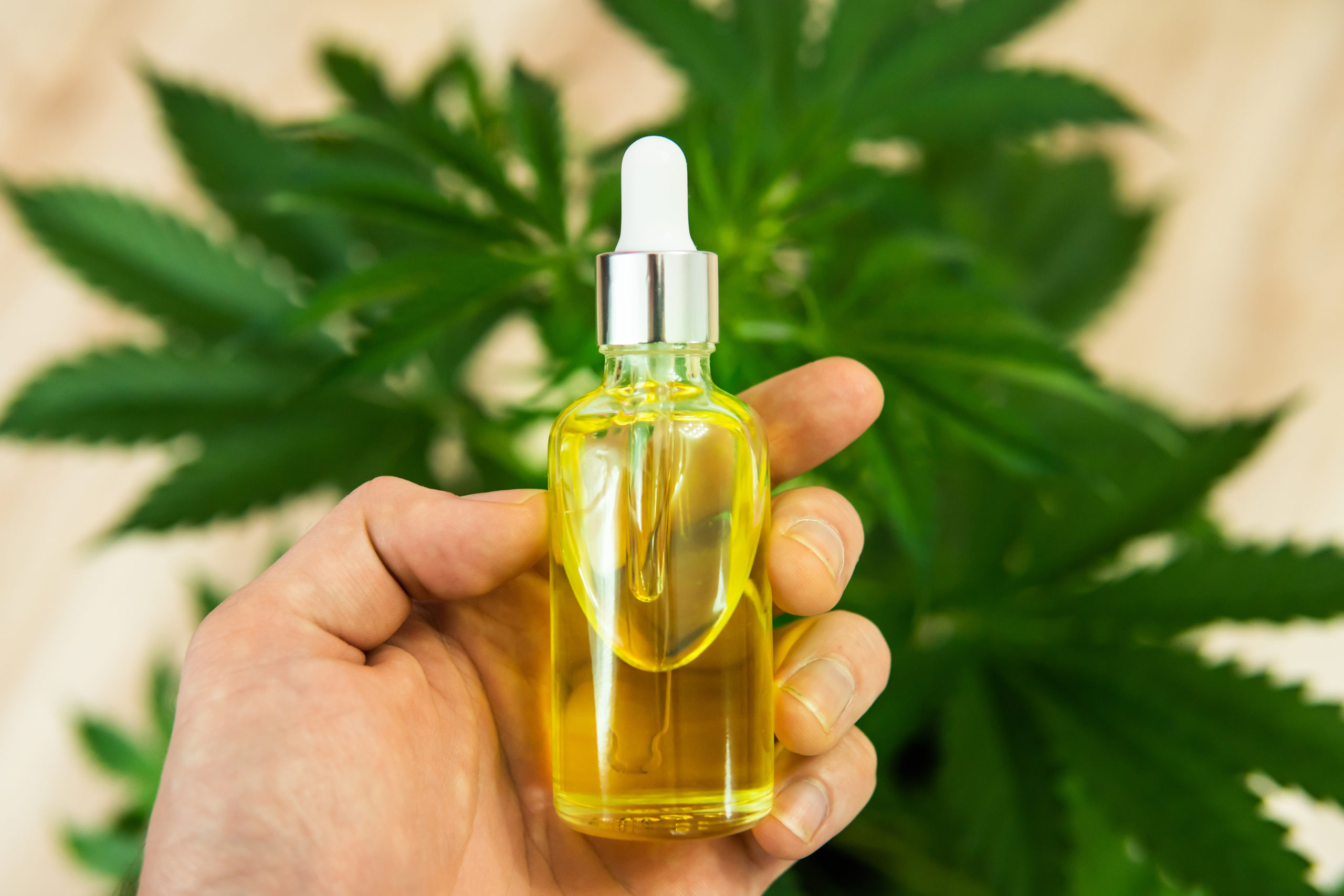-
- Market Research
- |
- CBD Near Me
- |
- Giveaways
- |
- Newsletter
- |
- Contact
- |
- Advertise
- |
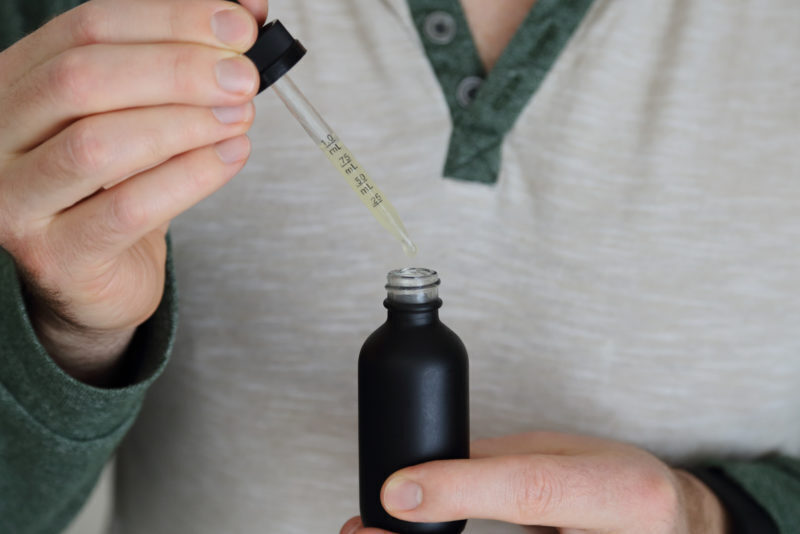
It is very unlikely that non-intoxicating CBD will cause you to fail a workplace drug test if that’s what brought you here.
In the case of taking consistently high doses of full-spectrum (not isolate) CBD oil or purchasing products from unsavory sellers that have exceeded the legally required 0.3 percent THC limit, you might be flagged, but even then, chances are slim.
Still, understanding how long CBD resides in your system can help you to space out your doses more effectively, test interactions with medications and other supplements, and gain a sense of its overall effectiveness.
The answer to this question of duration is a heavily nuanced one, given the wide-ranging set of factors that can influence it, but what scarce research we have on the topic has at least delineated a broad range.
In other words, there’s a short answer that will provide a ballpark idea and a much longer answer that will require you to plug in factors unique to your situation for a more accurate, yet still uncertain figure.
Let’s kill the suspense and start with the short answer.
How Long Does CBD Stay In Your System?
A research article by researchers from Drake University and the University of Wisconsin published in the journal Epilepsy Currents: Reviews and Critical Analysis, entitled “Cannabidiol: Promise and Pitfalls,” claims the half-life of orally-administered CBD is “about 1 to 2 days.”
There are two elements at play here that don’t exactly scream iron-clad evidence: first, the “about,” and second, the fact that a contemporary study by scientists from the Budapest University of Technology & Economics and the Hebrew University of Jerusalem published in Cannabis and Cannabinoid Research clocked CBD’s half-life at two to five days.
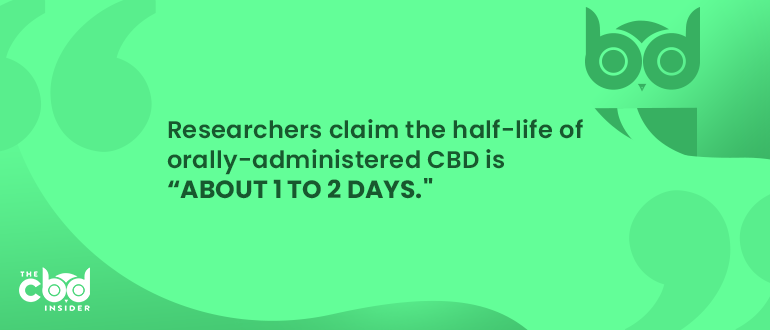
To clarify what exactly is being measured here, “elimination half-life” in the pharmaceutical context refers to the time that it takes for your body to process out half of an ingested substance.
The larger the dose, the more half-life cycles it will take to be diminished to a negligible amount.
We can use this same concept to carbon date millennia-old artifacts with incredible accuracy, so why the uncertainty in the case of CBD’s life cycle?
Enter the wild card that is human physiology (and the long answer).
If we wish to do better than “two to five days,” then we need to appreciate the many elements that can affect how the body metabolizes CBD.
How CBD Is Absorbed and Eliminated
Like many supplements, drugs, and other substances, orally-administered CBD undergoes “first-pass metabolism” before it enters the systemic circulation.
First-pass metabolism is the mechanism that lowers bioavailability, i.e., the percentage of ingested CBD that is actually used by the body, as referenced in the “Cannabidiol: Promise and Pitfalls” study (Welty, Luebke, & Gidal, 2014).
This means that, instead of directly entering the bloodstream after ingestion, orally-ingested CBD is first metabolized by the liver.
Here, cannabidiol is “hydroxylated,” a process that allows it to be broken down into usable forms, and eventually processed into the bloodstream at a significantly lower concentration than what was ingested (Ujváry & Hanuš, 2016).
After the liver processes CBD, the cannabinoid has yet another obstacle to overcome before it can be readily absorbed: the old proverb about oil and water.
CBD oil is a fatty substance, which by nature, disqualifies it from being absorbed in water.
In the human body, which consists of almost 75% water, this is a problem.
The solution our bodies use in this scenario involves synthesizing “micelles,” which are molecules that have a hydrophilic (water-loving) side and a lipophilic (fat-loving) side.
The lipophilic ends of these molecules surround the cannabidiol molecules, and thanks to the hydrophilic ends that are facing away from the CBD and toward the watery matrix around them, transportation and absorption through water is now possible.
When this is all said and done, metabolites—or waste products—involved in the breaking down of CBD by the liver, are then excreted in fecal matter (the majority) and urine.
Now that you have a framework surrounding how oral CBD is broken down and processed, you can better appreciate the many elements that influence how long it sticks around in your system.
Factors Affecting How Long CBD Stays In the Body
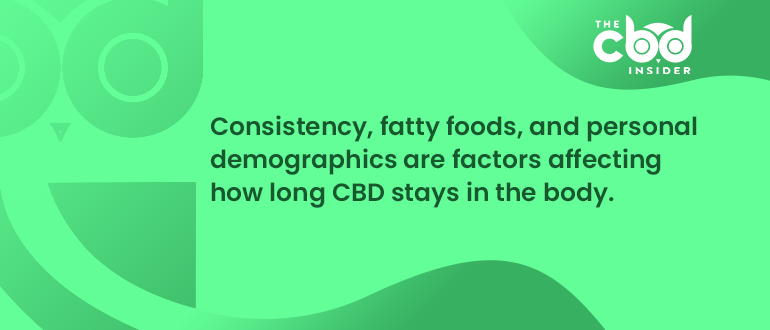
Perhaps the simplest metric we can highlight within the context of this discussion is the issue of dosage.
Whether you take 50 milligrams or five, the elimination half-life of CBD is the same, meaning the larger dose will take longer to be reduced to a negligible amount.
Consistency
Like many substances, fat-soluble CBD can build up in your system when used consistently.
If you take CBD on a very consistent basis, then you are likely to experience effects for a longer period of time than a beginner who takes a similar dose only one time.
Fatty Foods
Many CBD vendors include sesame oil with their CBD products because—recall from above—eating fatty foods in tandem with CBD allows your body to absorb more of the fat-soluble substance.
Increasing the bioavailability in this way allows for someone to get more out of a dose without increasing it.
A larger yield following first-pass metabolism means that it will take longer to be eliminated.
Personal Demographics
This is a bit of a “catch-all” category, but each factor herein can dramatically influence how long CBD (and many other substances) remain in your system.
Your weight, age, liver performance, genetic makeup, medical history, dietary preferences, and immune system functionality can all affect how long CBD stays in your body, how much of it is absorbed, and how potent its effects are.
An even more important determinant of the duration of cannabidiol’s effects is the ingestion method.
CBD Ingestion Methods Ranked by Half-Life
CBD can be smoked, intravenously administered, sprayed, orally ingested, or topically applied.
Some of these methods (i.v., topical) bypass the aforementioned first-pass metabolism, but because of other processes, this doesn’t necessarily mean they last longer.
A more reliable correlation in the above cases involves absorption speed; the effects are usually felt sooner with i.v. and topical administration than in the case of oral ingestion.
Also of note is the ability of intranasally administered CBD, which occurs to a limited extent when it is smoked or inhaled via nebulizer, to bypass the blood-brain barrier, meaning it goes around the brain’s cellular defense against drugs and acts directly on the brain almost immediately.
An academic review of the “Pharmacokinetics of Cannabidiol in Humans” by researchers from the Royal Derby Hospital in the UK and Artelo Biosciences in San Diego lists the elimination half-life of CBD as it relates to different administration routes:
- Oromucosal spray: between 1.44 and 10.86 hours (5-20 mg)
- I.V. administration: 24 hours
- Smoking: 31 hours
- Oral administration: 2 to 5 days
The oromucosal spray figure provided by this review came from a study referenced therein that used sublingual, buccal (cheek), and oropharyngeal (liquid spray applied to oral mucus and not swallowed) routes, which likely accounts for much of this variance.
How to Leverage These Insights for Smarter Self-Care
Looking back at everything we’ve just investigated, we can now create a comprehensive set of factors that may influence the amount of time that CBD stays in our bodies after being ingested.
It might be helpful to think of this list of factors as a simple algorithm that you can use as a checklist to either add or take away elimination time depending on your scenario.
For example, if you’ve been orally ingesting large doses of CBD consistently, you have three reasons to believe you’re closer to the 5-6 day end of the spectrum, whereas someone who administered intravenously for the first time will be closer to the 2-3 day end.
Once you’ve gained an acute sense of how long CBD lasts in your system, you can make more informed and confident decisions when it comes to setting or changing doses, introducing other supplements, and more.


